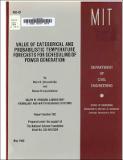Value of Categorical and Probabilistic Temperature Forecasts for Scheduling of Power Generation
Author(s)
Alexandridis, Mark G.; Krzysztofowicz, Roman
Download10427343.pdf (5.039Mb)
Metadata
Show full item recordAbstract
Bayesian decision models are formulated for the use and evaluation of categorical and probabilistic forecasts of continuous variables. The models are applied to the problem of short-term scheduling of power generation in an electric system on the basis of a single-period temperature forecast. Likelihood functions are constructed using results of experiments conducted at the National Weather Service. The probabilistic forecasting scheme is of the type wherein the forecaster quantifies his degree of uncertainty in terms of variable-width, fixed-probability credible intervals. Each forecasting scheme, categorical and probabilistic, is evaluated in a coupling with two decision procedures: (1) an optimal (Bayesian) procedure which accounts for forecast uncertainty, and (2) a more conventional, non-optimal, procedure which disregards forecast uncertainty, but which would be optimal if the forecasts were perfect. Numerical examples are presented to illustrate the economic values of both types of forecasts, gains from probabilistic forecasts, and expected opportunity losses to be incurred by decision makers who ignore forecast uncertainty. Key words; Bayesian decision theory, value of information, meteorologic forecasts, probabilistic forecasts, electric power generation, power load forecasting.
Description
Prepared under the support of The National Science Foundation Grant No. CEE-8107204
Date issued
1982-05Publisher
Cambridge, Mass. : Ralph M. Parsons Laboratory, Hydrology and Water Resource Systems, Massachusetts Institute of Technology, Dept. of Civil Engineering
Other identifiers
282
Series/Report no.
R (Massachusetts Institute of Technology. Department of Civil Engineering) ; 82-40.Report (Ralph M. Parsons Laboratory for Water Resources and Hydrodynamics) ; 282.